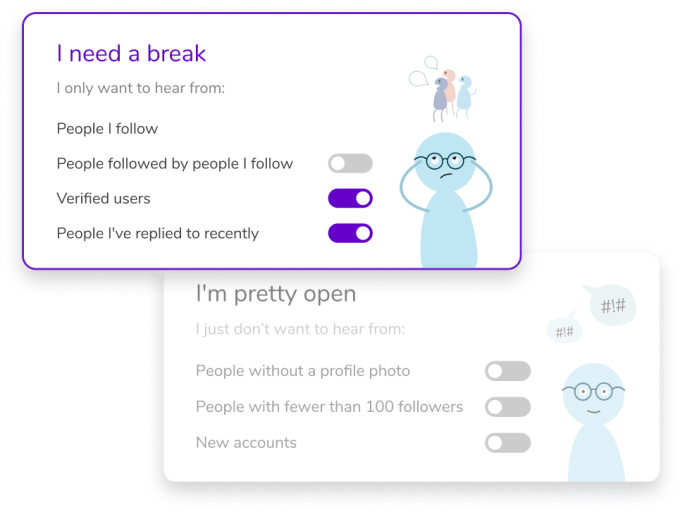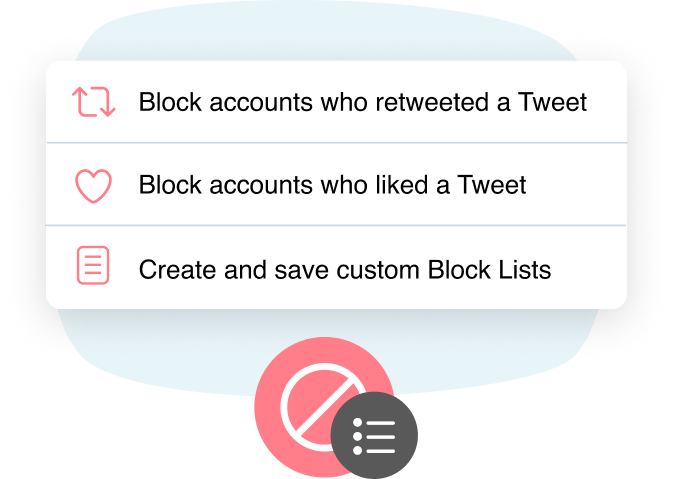If you’ve experienced any form of harassment on Twitter in the last couple of years, then you’ve probably heard of Block Party. And if you haven’t, lucky you!
Developed by software engineer and tech diversity advocate Tracy Chou, Block Party helps people curate a safer experience on Twitter. By building on top of Twitter’s API, Block Party lets users automate the process of blocking bad actors and creating block lists on Twitter. For example, if a particular tweet is breeding harassment, then you can automatically block anyone who likes or retweets that post.
Block Party launched in early 2021, but now, the company hopes to expand to other social platforms with the help of $4.8 million in seed funding.
“We’ve gotten a bunch of initial validation around, is this product going to be useful to folks? Is it going to be possible to build on top of platforms?” Chou told TechCrunch. “Is there going to be a willingness to pay for this, like how big is the market here?”
So far, the concept has proved itself. Chou said Block Party has attracted a variety of users, including both public figures and smaller accounts that simply want more privacy controls. As far as building on Twitter’s API goes, Chou said that Twitter proactively reached out to Block Party to make sure they can work in tandem.
“It’s been really cool to see that they understand that strategic alignment, where it’s a win-win-win to have a company like Block Party building the safety tooling,” Chou told TechCrunch. “It’s good for the end user, because they have better tooling to be more in control of their experience.” And it’s good for the platform, since they don’t have to dedicate the engineering and product design resources to the cause.

Image Credits: Block Party
Block Party is available as both a free and a paid service. As a non-paying subscriber, you can access tools like “moderate filters,” which mutes accounts that are more likely to be harassing, like newly-created accounts with few followers and no profile picture. Paid subscribers unlock access to features like keyword filters, allowing users to automatically block or mute accounts in their mentions with specific keywords or emojis in their username, display name or bio. Another paid feature, “helper view,” lets users assign a friend to help manage their account settings. Instead of sifting through damaging tweets yourself, this tool allows a friend to help you manage your filters, block lists and watchlists.
Chou describes Block Party as “middleware,” a term that reflects how users can take more control of their experience on social media through individualized, third-party apps.
“It doesn’t really make sense sometimes for platforms to get into some of these messages around defining what’s acceptable or not. They’re going to be able to define Terms of Service,” Chou explained. “But there’s gonna be a bunch of stuff in the middle where individual users may not want to see that content, but it doesn’t make sense for Twitter to ban a user for calling me ugly or stupid.”

Image Credits: Block Party
Instead of getting tied up in an ideological debate about what bad behavior is a punishable offense, users can turn to “middleware” like Block Party to decide for themselves as individuals what content they want to see. As Chou says, it’s not against the Twitter rules to call someone ugly — but that doesn’t mean you should have to see that in your mentions.
In theory, Twitter could build these filtering options itself. But Chou thinks social media platforms simply aren’t incentivized to prioritize safety over pure usage.
“I think looking at the structural incentives is very telling. Platforms are incentivized to produce more engagement — that is their North Star,” Chou said. “So that is what they’re going to be putting all of their resources towards.”
Right now, for example, as Twitter faces a legal battle with Elon Musk where $44 billion is at stake, internal priorities have shifted. The Verge reported that Twitter’s health team was reorganized into a team charged with identifying spam accounts, since Musk has used fake accounts as a key facet of his argument to terminate his acquisition of the platform. So, if Twitter isn’t able to dedicate as much resources to safety as it would like, at least Block Party can.
As Block Party plans to expand to other social platforms, Chou and her team of four full-time employees have curated a list of strategic investors that can help take the company to the next level. Some investors include Twitter’s director of machine learning ethics, Dr. Rumman Chowdhury; ex-Twitter head of product Jeff Seibert; Pinterest co-founder Evan Sharp; former Instagram head of growth Bangaly Kaba and other experienced social media execs. The round was led by Stellation Capital with participation from Impellent Ventures, Fuel Capital, Goodwater Capital and Hyphen Capital.
Block Party, a tool to combat online harassment, raises a $4.8M seed by Amanda Silberling originally published on TechCrunch















 English (US) ·
English (US) ·